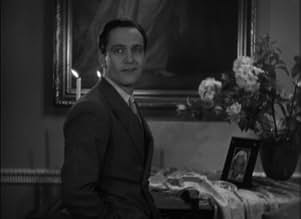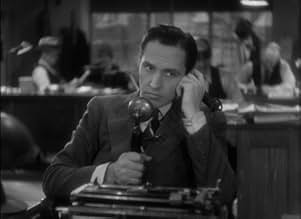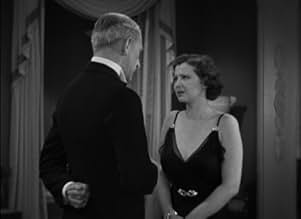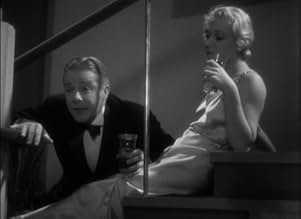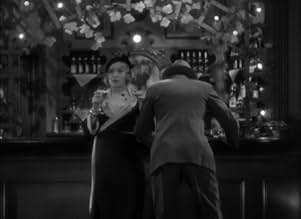NOTE IMDb
6,9/10
2,2 k
MA NOTE
Ajouter une intrigue dans votre langueA drunken newspaperman is rescued from his alcoholic haze by an heiress whose love sobers him up and encourages him to write a play, but he lapses back into dipsomania.A drunken newspaperman is rescued from his alcoholic haze by an heiress whose love sobers him up and encourages him to write a play, but he lapses back into dipsomania.A drunken newspaperman is rescued from his alcoholic haze by an heiress whose love sobers him up and encourages him to write a play, but he lapses back into dipsomania.
- Réalisation
- Scénario
- Casting principal
- Récompenses
- 3 victoires au total
Richard 'Skeets' Gallagher
- Buck
- (as Skeets Gallagher)
Ernie Adams
- Reporter
- (non crédité)
Mildred Boyd
- June
- (non crédité)
Edna Callahan
- Bridesmaid
- (non crédité)
Leonard Carey
- Prentice's Butler
- (non crédité)
Harry Cording
- Fred
- (non crédité)
Milla Davenport
- Prentice's Housekeeper
- (non crédité)
Avis à la une
Clever dialogue, fantastic acting, and several great scenes made this film a delight for me, but be forewarned, its main character may have you saying 'grrr', and reduce your enjoyment. Frederic March plays a newspaper reporter / playwright who has a drinking problem, and it's while he's drunk at a party that he meets a charming young lady, played by Sylvia Sidney. The two hit it off and despite the concerns of her rich father (George Irving), get married. Things get complicated when his ex-lover (Adrianne Allen) re-surfaces and he struggles to control his problem.
It's a very strong cast all around, and Sidney in particular turns in a great performance. She ranges from a sweet, naïve, and trusting soul, loving unconditionally, to hurt and confused, to woman whose solution is to give her husband a taste of his own medicine, in a rather shocking development. The scene with her partying with her own young lover (Cary Grant no less) and his friends and quipping "Gentlemen, I give you the holy state of matrimony, modern style: single lives, twin beds and triple bromides in the morning" is sad, empowering, and a little thrilling all at the same time. As they're in a bar that's practically a den of iniquity, it's all clearly pre-code, but there is an intelligence and honesty in this scene, and throughout the movie.
March is also strong as this affable but flawed man, and in early scenes we smile at his partying, at one point yelling "Is there a baritone in the house?" until he finds a barman to fill out a quartet with his friends so that they can break out in song. The warning signs are there in his tardiness and even at his wedding, as he and his best man (Skeets Gallagher) fumble for the ring, which he's forgotten. That scene is one of several that are well directed by Dorothy Arzner, as she cuts to guests making observations and the facial reactions of March and Sidney as they say their vows.
There is a lot of partying and revelry which may put some viewers off, but I found that allowed for some fantastic moments. In one, March asks Sidney to shut the door and hold him back from going to the other woman, and in a strong way she opens it wide and says "I'm no jailer - get out!" In another, as March and Allen 'play-act' a passionate kiss to the merriment of others right in front of her, we feel the shock and humiliation amplified by her brilliant facial reaction.
The title is clearly meant to titillate, but the film has real substance beneath. It's wild, but also realistic, though I didn't care too much for the ending. We see what destructive behavior leads to, and in that I suppose there is a message, but it's delivered without heavy-handed moralizing. The plot is a tad melodramatic, but it's daring and unique in the areas it explores. Well worth checking out, if you're in the mood for pre-code.
It's a very strong cast all around, and Sidney in particular turns in a great performance. She ranges from a sweet, naïve, and trusting soul, loving unconditionally, to hurt and confused, to woman whose solution is to give her husband a taste of his own medicine, in a rather shocking development. The scene with her partying with her own young lover (Cary Grant no less) and his friends and quipping "Gentlemen, I give you the holy state of matrimony, modern style: single lives, twin beds and triple bromides in the morning" is sad, empowering, and a little thrilling all at the same time. As they're in a bar that's practically a den of iniquity, it's all clearly pre-code, but there is an intelligence and honesty in this scene, and throughout the movie.
March is also strong as this affable but flawed man, and in early scenes we smile at his partying, at one point yelling "Is there a baritone in the house?" until he finds a barman to fill out a quartet with his friends so that they can break out in song. The warning signs are there in his tardiness and even at his wedding, as he and his best man (Skeets Gallagher) fumble for the ring, which he's forgotten. That scene is one of several that are well directed by Dorothy Arzner, as she cuts to guests making observations and the facial reactions of March and Sidney as they say their vows.
There is a lot of partying and revelry which may put some viewers off, but I found that allowed for some fantastic moments. In one, March asks Sidney to shut the door and hold him back from going to the other woman, and in a strong way she opens it wide and says "I'm no jailer - get out!" In another, as March and Allen 'play-act' a passionate kiss to the merriment of others right in front of her, we feel the shock and humiliation amplified by her brilliant facial reaction.
The title is clearly meant to titillate, but the film has real substance beneath. It's wild, but also realistic, though I didn't care too much for the ending. We see what destructive behavior leads to, and in that I suppose there is a message, but it's delivered without heavy-handed moralizing. The plot is a tad melodramatic, but it's daring and unique in the areas it explores. Well worth checking out, if you're in the mood for pre-code.
Everybody here is terrific, and Paramount brought out its A-list stars for the leads, Sylvia Sidney as heiress Joan Prentice and Fredric March as aspiring playwright Jerry Corbett. They are a young couple who marry in spite of the fact that Jerry is an alcoholic who is still stuck on a past heartbreak, stage actress Claire Hempstead.
The plot treads a conventional path full of precode tropes - infidelity, drunkenness, open marriage, the inconvenient pregnancy, and the wealthy family of one spouse distrusting the not so wealthy other spouse and his motives. But yet it is interesting because of several - "Wow did they do that back then?" moments.
For example - Jerry works at a newspaper. When somebody makes an insulting remark about his upcoming wedding, Jerry punches him in the throat. And yet nobody gets fired or arrested. Prohibition is still in force, and everybody drinks everywhere. Nobody even bothers with the discretion of a flask. There is booze at private parties, booze in public places, booze everywhere. When a turkey gets accidentally dropped on the floor, the alternative is... canned chicken??? Ugh. I would think the couple didn't want to have me over for dinner in the first place. Then there is Jerry's hit play up in lights - "When Women Say No - a satirical comedy". Yikes!
Need I mention that the art design and Sylvia Sidney's fashions are gorgeous. With Skeets Gallagher as Jerry's best friend, the great Esther Howard who seems to be in some kind of relationship with Skeets' character and had a marriage end because of her former husband's drinking - she's always memorable, and Cary Grant as one of Joan's extramarital escorts with what seems to be his original nose.
The plot treads a conventional path full of precode tropes - infidelity, drunkenness, open marriage, the inconvenient pregnancy, and the wealthy family of one spouse distrusting the not so wealthy other spouse and his motives. But yet it is interesting because of several - "Wow did they do that back then?" moments.
For example - Jerry works at a newspaper. When somebody makes an insulting remark about his upcoming wedding, Jerry punches him in the throat. And yet nobody gets fired or arrested. Prohibition is still in force, and everybody drinks everywhere. Nobody even bothers with the discretion of a flask. There is booze at private parties, booze in public places, booze everywhere. When a turkey gets accidentally dropped on the floor, the alternative is... canned chicken??? Ugh. I would think the couple didn't want to have me over for dinner in the first place. Then there is Jerry's hit play up in lights - "When Women Say No - a satirical comedy". Yikes!
Need I mention that the art design and Sylvia Sidney's fashions are gorgeous. With Skeets Gallagher as Jerry's best friend, the great Esther Howard who seems to be in some kind of relationship with Skeets' character and had a marriage end because of her former husband's drinking - she's always memorable, and Cary Grant as one of Joan's extramarital escorts with what seems to be his original nose.
A wonderful and unsettling pre-Code film about an alcoholic playboy (Fredric March) who marries a sweet young thing (Sylvia Sidney) and proceeds to drag her down his path of dissolution. The depiction of their marriage is quite shocking, even by today's standards -- not only do they have an "open" marriage, they openly practice that freedom in front of their friends, suggesting a swinging lifestyle that wouldn't become approachable as subject matter in films for another 30+ years. March and Sidney give fantastic performances, and Dorothy Arzner, one of the rare women directors of the time, takes a matter of fact approach that leaves behind the melodrama and sentimentality that might have blunted this same story's impact in the hands of someone else.
One of the most refreshing aspects of "Merrily We Go to Hell," and one of the most shocking, is that Sidney's character does not suffer nobly while we wait for March to see the error of his ways and come back to her a chastened man. Instead, Sidney starts to behave just like him, coming within a stone's throw of alcoholism herself, and doing her own share of philandering. In that way, the film is even a little progressive in its equal treatment of the genders, even if that equality is the equality of debauchery.
Grade: A
One of the most refreshing aspects of "Merrily We Go to Hell," and one of the most shocking, is that Sidney's character does not suffer nobly while we wait for March to see the error of his ways and come back to her a chastened man. Instead, Sidney starts to behave just like him, coming within a stone's throw of alcoholism herself, and doing her own share of philandering. In that way, the film is even a little progressive in its equal treatment of the genders, even if that equality is the equality of debauchery.
Grade: A
***SPOILERS*** ***SPOILERS*** MERRILY WE GO TO HELL (Paramount, 1932), directed by Dorothy Arzner, is not a horror movie about Satan worshipers who hold Black Masses in Transylvania, as the title may indicate. It's is a story about an heiress names Joan Prentiss (Sylvia Sidney) who meets Jerry Corbett (Fredric March), a drunken newspaperman, on the rooftop during a party. Jerry's ambition is to become a successful playwright. Within a short time he falls in love with Joan, but Joan's father (George Irving) disapproves of Jerry because of his careless ways. He offers to buy Jerry out of marrying his daughter, but refuses to accept the $50,000. Quite happy that Jerry's sole interest is in his daughter, he gleefully approves of the upcoming marriage. During the wedding ceremony, Jerry, somewhat drunk, forgets the wedding ring and finds himself in an embarrassing situation by placing a beer tap on Joan's finger. Time passes. Jerry writes the comedy play, "When Women Say No," and it gets produced. The leading lady turns out to be Claire Hempstead (Adrienne Ames), Jerry's former girlfriend. While the play proves successful, Jerry's married life is not, especially when Joan finds he's spending more time with Claire as well with the booze. Not wanting to be an old-fashioned wife, Joan decides not to let this bother her by dating Charlie Baxter (Cary Grant), the leading man of the play, to society functions. Disgusted, Joan finally does leaves Jerry without telling him she's pregnant with his child. Old Man Prentiss tries his best to keep Jerry from visiting Joan in the hospital, where she's in danger of possibly losing either her life or baby.
The title, MERRILY WE GO TO HELL, happens to be the catch phrase used by March several times in the story before taking a drink. The movie in itself is forgotten with a familiar plot quite common during the Depression era. Film titles using "Hell" in it were also quite common practice during that time, until the production code people stepped in and put a stop to that, for the time being anyway. This romancer may be of some interest to film buffs today, especially seeing it being an early screen appearance by Cary Grant, in his third featured role. He is first seen (in long shot) wearing period costume and wig in Jerry's stage play opposite Adrienne Ames, and later at a social function in dinner clothes after the play's opening, before his character disappears. Sylvia Sidney does what she does best playing a long suffering girl, a kind of role she played from time to time, possibly because of her sweet and tender face. Before the end of 1932, Grant would elevate to becoming Sidney's co-star in one of her most tender movie roles, MADAME BUTTERFLY.
Also featured the cast of MERRILY WE GO TO HELL is Richard "Skeets" Gallagher as Buck, Jerry's reporter friend with a talent for tap-dancing, adding some amusing support during the film's serious moments; Kent Taylor as Gregory; and Florence Britton as Charlcie. Background music score includes "What a Little Thing Like a Wedding Ring Can Do" and "We Will Always Be Sweethearts," songs introduced in Paramount's 1932 musical hit, ONE HOUR WITH YOU starring Maurice Chevalier and Jeanette MacDonald.
In spite of good actors rising above somewhat average script, it's worth seeing as a curiosity on DVD (double featured with 1931's THE CHEAT), and on Turner Classic Movies (TCM premiere: September 1, 2020). If the story may not be an attention grabber, the title definitely is. (**)
The title, MERRILY WE GO TO HELL, happens to be the catch phrase used by March several times in the story before taking a drink. The movie in itself is forgotten with a familiar plot quite common during the Depression era. Film titles using "Hell" in it were also quite common practice during that time, until the production code people stepped in and put a stop to that, for the time being anyway. This romancer may be of some interest to film buffs today, especially seeing it being an early screen appearance by Cary Grant, in his third featured role. He is first seen (in long shot) wearing period costume and wig in Jerry's stage play opposite Adrienne Ames, and later at a social function in dinner clothes after the play's opening, before his character disappears. Sylvia Sidney does what she does best playing a long suffering girl, a kind of role she played from time to time, possibly because of her sweet and tender face. Before the end of 1932, Grant would elevate to becoming Sidney's co-star in one of her most tender movie roles, MADAME BUTTERFLY.
Also featured the cast of MERRILY WE GO TO HELL is Richard "Skeets" Gallagher as Buck, Jerry's reporter friend with a talent for tap-dancing, adding some amusing support during the film's serious moments; Kent Taylor as Gregory; and Florence Britton as Charlcie. Background music score includes "What a Little Thing Like a Wedding Ring Can Do" and "We Will Always Be Sweethearts," songs introduced in Paramount's 1932 musical hit, ONE HOUR WITH YOU starring Maurice Chevalier and Jeanette MacDonald.
In spite of good actors rising above somewhat average script, it's worth seeing as a curiosity on DVD (double featured with 1931's THE CHEAT), and on Turner Classic Movies (TCM premiere: September 1, 2020). If the story may not be an attention grabber, the title definitely is. (**)
Cleo Lucas wrote 'I, Jerry, take thee Joan', her only novel, at the tender age of twenty-four and it has been adapted by Edwin Justus Mayer for Paramount whilst marking the last film directed for that studio by Dorothy Arzner before going freelance.
Early on in the film the newly engaged Jerry of Fredric March asks: "Have I a right to take a swell girl and make her a wife?" Thus setting the scene for another of Ms. Arzner's stealthy critiques of the married state.
As expected, her direction is impeccable, her editing seamless and the magnificent performances she has drawn from her two leading players makes this emotional rollercoaster riveting viewing.
The all-important chemistry between March and the enchanting Sylvia Sidney as Joan without which the film would not work, is palpable from the outset. Her character develops and grows in strength as the film progresses whilst in his fourth film for this director, his portrayal of a tragic drunk makes him perfect casting for the role of Norman Maine five years later. Classy English actress Adrianne Allen is Jerry's old flame whose reappearance spells disaster.
Ambivalence runs through Ms. Arzner's oeuvre, never more so than in the ending here which is both happy and deeply tragic.
Early on in the film the newly engaged Jerry of Fredric March asks: "Have I a right to take a swell girl and make her a wife?" Thus setting the scene for another of Ms. Arzner's stealthy critiques of the married state.
As expected, her direction is impeccable, her editing seamless and the magnificent performances she has drawn from her two leading players makes this emotional rollercoaster riveting viewing.
The all-important chemistry between March and the enchanting Sylvia Sidney as Joan without which the film would not work, is palpable from the outset. Her character develops and grows in strength as the film progresses whilst in his fourth film for this director, his portrayal of a tragic drunk makes him perfect casting for the role of Norman Maine five years later. Classy English actress Adrianne Allen is Jerry's old flame whose reappearance spells disaster.
Ambivalence runs through Ms. Arzner's oeuvre, never more so than in the ending here which is both happy and deeply tragic.
Le saviez-vous
- AnecdotesThe word "Hell" could not be used in the UK as part of a title, so the UK version was simply retitled "Merrily We Go to ____".
- GaffesIn the latter part of the picture Jerry Corbett (Fredric March) receives a letter in a postmarked envelope from his wife Joan (Sylvia Sidney). It's addressed to Jerry with his name and street address, but no city.
- Citations
Joan Prentice: Gentlemen, I give you the holy state of matrimony, modern style: single lives, twin beds and triple bromides in the morning.
- ConnexionsFeatured in Women Make Film: A New Road Movie Through Cinema (2018)
Meilleurs choix
Connectez-vous pour évaluer et suivre la liste de favoris afin de recevoir des recommandations personnalisées
- How long is Merrily We Go to Hell?Alimenté par Alexa
Détails
- Date de sortie
- Pays d’origine
- Langue
- Aussi connu sous le nom de
- Contentos vamos al infierno
- Lieux de tournage
- Société de production
- Voir plus de crédits d'entreprise sur IMDbPro
- Durée
- 1h 23min(83 min)
- Couleur
- Rapport de forme
- 1.37 : 1
Contribuer à cette page
Suggérer une modification ou ajouter du contenu manquant

